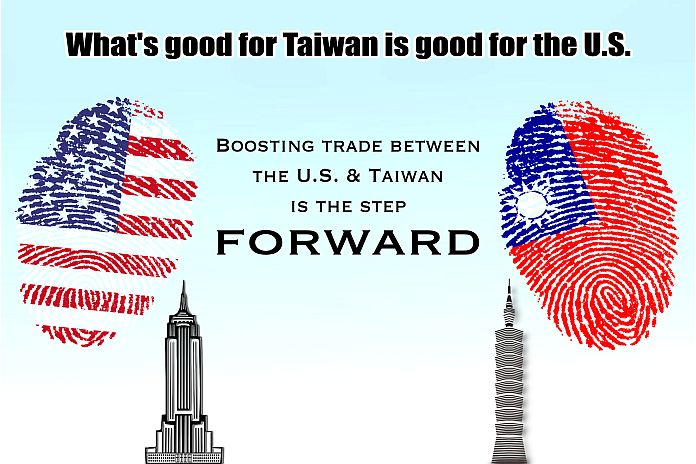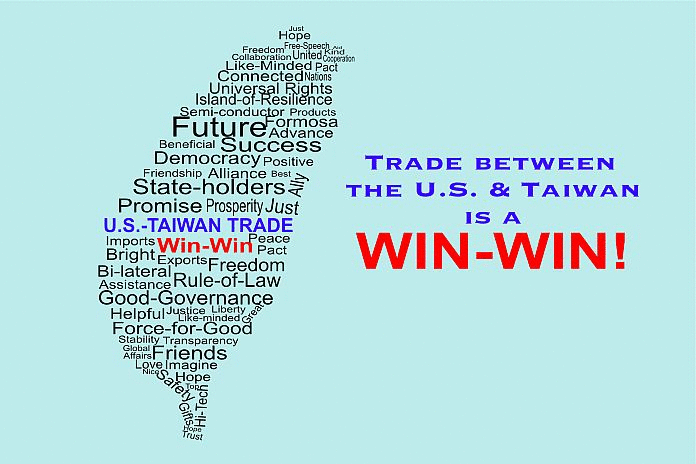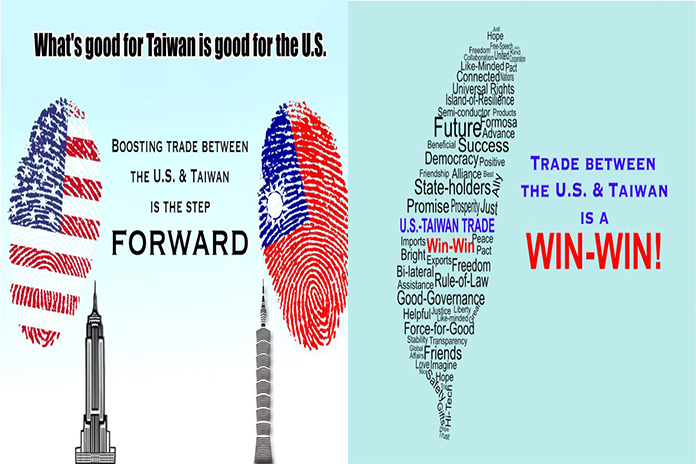By Caribbean News Global ![]()
TORONTO, Canada – Recent developments in US – Taiwan relations offer a unique opportunity to examine how the two countries economic growth, interest, and priorities are the step forward in a win-win scenario.
On April 21, 2021, president Tsai Ing-wen attended the annual Hsieh Nien Fan banquet hosted by the American Chamber of Commerce in Taiwan (AmCham Taiwan). President Tsai recognized and appreciated the establishment of the US-Taiwan Bilateral Trade Agreement Coalition, and reiterated the need for a strong Taiwan-US economic partnership.
“ I want to conclude by extending our appreciation to AmCham Taiwan and the US-Taiwan Business Council (USTBC) for establishing the US-Taiwan Bilateral Trade Agreement Coalition,” said president Tsai. […] “Our economic partnership can also be strengthened further by resuming talks under the Trade and Investment Framework Agreement (TIFA) to lay the foundation for our BTA negotiations. Having been involved in Taiwan’s trade negotiations for many years, I fully understand the immeasurable importance of trade and investment for our partnerships. So you can rest assured that our government will uphold our commitment to improving and maintaining a robust trade and investment environment.” Source:Office of the President

Boosting trade between the US – Taiwan is the step forward
The US – Taiwan Business Council (USTBC) is dedicated to developing the trade and business relationship between the United States and Taiwan. The organization serves its members – public and private companies with business interests in Taiwan, and range in size from one-person consulting firms to large multinational corporations – as a portal to Taiwan, and aspires to be an effective representative for those members in dealing with business, trade, and investment matters.
Taiwan’s participation at the 2021 SelectUSA Investment Summit, June 7-11, is the highest-profile event dedicated to promoting Foreign Direct Investment (FDI) in the United States, … enabling necessary direct connections between investors and US Economic Development Organizations (EDOs).
Simultaneously, the Council of USTBC, on Monday, June 7, was host to the 2021 Virtual Taiwan-US Defense Business Forum, one of several conferences, seminars, receptions, and other events to promote business relationships, provide a forum for industry-specific discussions, and offer access to a network of corporate leaders and government officials. In addition, to information exchanged on US – Taiwan business issues.
Trade between the US – Taiwan is a win-win
The Asia-Pacific is the world’s leading region for economic growth, contributing to trade and expansion.
Taiwan has expressed its willingness and continues to convey its capabilities/capacity to join the trans-Pacific trade partnership. The big unknown is whether the United States will re-engage and return since its withdrawal by the Trump administration.
The Comprehensive and Progressive Agreement for Trans-Pacific Partnership (CPTPP) is a free trade agreement between 11 countries include: Australia, Brunei, Chile, Canada, Japan, Malaysia, Mexico, New Zealand, Peru, Singapore and Vietnam.
The CPTPP trading bloc of 11 countries represents 13.5 percent of global GDP and 495 million consumers. The UK will soon join CPTPP and possible boost the country’s trade/agreements following Brexit.
“We welcome the formal request to accede to the CPTPP received from the United Kingdom on February 1, 2021, and, acting upon the request, the Parties have reached a decision to commence an accession process with the United Kingdom and establish an Accession Working Group. We share the view that the commencement of an accession process with the United Kingdom and the potential expansion of the CPTPP will send a strong signal to our trading partners around the world, of our commitment to support a free, fair, open, effective, inclusive and rules-based trading system.,” the ministers said in a joint statement.
Meanwhile, the Economic Prosperity Network (EPN), [discussions started in March 2020] an alliance of countries committed to fair and mutually beneficial trade practices, with the United States was formed in the wake of the COVID-19 pandemic, which was seen to disrupt global supply chains.
The United States government wants it to include Australia, India, Japan, New Zealand, South Korea and Vietnam. Its discussions include trade, health initiatives, development and aid.
Expanded economic engagement and the signing of a high-standards and comprehensive bilateral US – Taiwan trade agreement is significant to Taiwan’s global economic integration.
The merit of this is the mutually beneficial economic potential that offers expanded market access in agriculture, telecommunications, finance, and energy. Moreover, the US –Taiwan trade relations would be more tightly connected to each-others supply chain and economic orbit.
On the other hand, recent progress in strengthening and expanding US – Taiwan relations is significant, noting that negotiations on bilateral trade agreement (BTA) on the EPN with Taiwan is a win-win scenario for president Tsai Ing-wen administration.
Ministry of Foreign Affair (MOFA) spokesperson Joanne Ou announced in January that “after 50 American senators sent a joint letter last October to the US Trade Representative (USTR) in support of a BTA with Taiwan, 161 US House representatives did the same in December.” In addition, “the American Chamber of Commerce in Taiwan recently established a US –Taiwan Bilateral Trade Agreement Coalition with the US – Taiwan Business Council in Virginia, which was an indicator of private sector support for the proposed trade deal,” Ou emphasised: “The communication channel between Taiwan’s economic and trade departments and the USTR remains unimpeded.”

What’s good for Taiwan is good for the US
As a new round of negotiations and real progress is made on full US-Taiwan bilateral trade deals, economic and political relations, this represents an alliance of “trusted partners” that have much in common, inclusive of an open economy, reducing tariff and non-tariff barriers, trade stability and security.
These unprecedented and unilateral moves have affirmed Taiwan’s democratic principles, values and standards as an appropriate partner for international trade. As well as, Taiwan’s economic well-being, a model the US and others can emulate.
Given the significance of US – Taiwan supply chains, the importance for Taiwan’s prosperity and security, international trade and investment, and considering USTBC, CPTPP and EPN – boosting trade between the US – Taiwan is the step forward – to economic well-being for all.
It is plausible that the signing of high-standards and comprehensive US –Taiwan bilateral agreements are on the horizon in short order.





